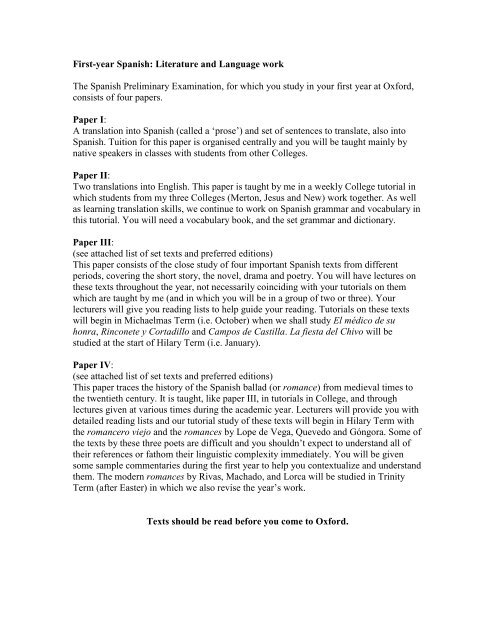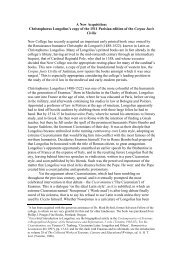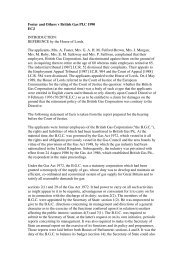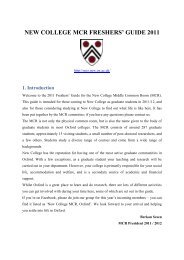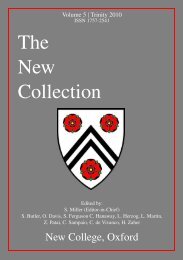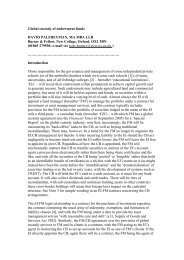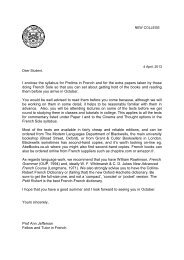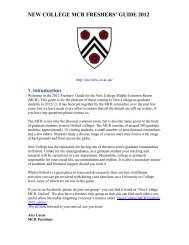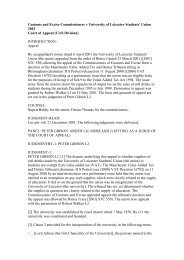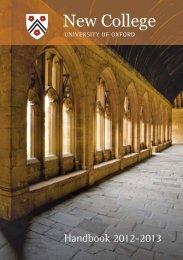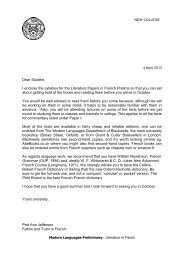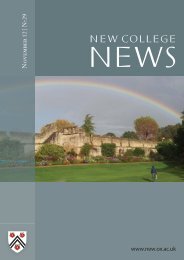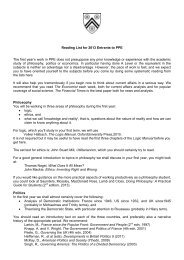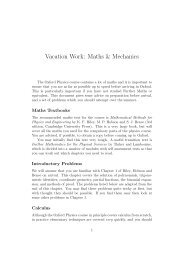Spanish reading list (pdf) - New College
Spanish reading list (pdf) - New College
Spanish reading list (pdf) - New College
You also want an ePaper? Increase the reach of your titles
YUMPU automatically turns print PDFs into web optimized ePapers that Google loves.
First-year <strong>Spanish</strong>: Literature and Language workThe <strong>Spanish</strong> Preliminary Examination, for which you study in your first year at Oxford,consists of four papers.Paper I:A translation into <strong>Spanish</strong> (called a ‘prose’) and set of sentences to translate, also into<strong>Spanish</strong>. Tuition for this paper is organised centrally and you will be taught mainly bynative speakers in classes with students from other <strong>College</strong>s.Paper II:Two translations into English. This paper is taught by me in a weekly <strong>College</strong> tutorial inwhich students from my three <strong>College</strong>s (Merton, Jesus and <strong>New</strong>) work together. As wellas learning translation skills, we continue to work on <strong>Spanish</strong> grammar and vocabulary inthis tutorial. You will need a vocabulary book, and the set grammar and dictionary.Paper III:(see attached <strong>list</strong> of set texts and preferred editions)This paper consists of the close study of four important <strong>Spanish</strong> texts from differentperiods, covering the short story, the novel, drama and poetry. You will have lectures onthese texts throughout the year, not necessarily coinciding with your tutorials on themwhich are taught by me (and in which you will be in a group of two or three). Yourlecturers will give you <strong>reading</strong> <strong>list</strong>s to help guide your <strong>reading</strong>. Tutorials on these textswill begin in Michaelmas Term (i.e. October) when we shall study El médico de suhonra, Rinconete y Cortadillo and Campos de Castilla. La fiesta del Chivo will bestudied at the start of Hilary Term (i.e. January).Paper IV:(see attached <strong>list</strong> of set texts and preferred editions)This paper traces the history of the <strong>Spanish</strong> ballad (or romance) from medieval times tothe twentieth century. It is taught, like paper III, in tutorials in <strong>College</strong>, and throughlectures given at various times during the academic year. Lecturers will provide you withdetailed <strong>reading</strong> <strong>list</strong>s and our tutorial study of these texts will begin in Hilary Term withthe romancero viejo and the romances by Lope de Vega, Quevedo and Góngora. Some ofthe texts by these three poets are difficult and you shouldn’t expect to understand all oftheir references or fathom their linguistic complexity immediately. You will be givensome sample commentaries during the first year to help you contextualize and understandthem. The modern romances by Rivas, Machado, and Lorca will be studied in TrinityTerm (after Easter) in which we also revise the year’s work.Texts should be read before you come to Oxford.
As you know the learning of a language is a gradual business. You should take everyopportunity to enrich your knowledge of <strong>Spanish</strong> by speaking the language when youhave the chance, <strong>reading</strong> the newspapers and watching or <strong>list</strong>ening to news and otherbroadcasts, and noting down new vocabulary or words and phrases that you don’tunderstand as you hear and read them. An active attitude to language acquisition and awillingness to go on learning is enormously helpful for a language student.The literary side of the course will be new to many students and although some feeluncertain as they undertake the <strong>reading</strong>, the vast majority of students at Oxford end uprelishing this part of the course and the worlds it opens up. It can take some time and hardwork to come to terms with the content and the demands of the literature papers and so itpays to be prepared. As well as <strong>reading</strong> the texts set, you should try to see and discuss<strong>Spanish</strong> plays and films and read something about the history and culture of Spain and<strong>Spanish</strong> America. Below are some suggestions that you may find helpful:Raymond Carr, ed., Spain: A History (Oxford, OUP, 2000)Edwin Williamson, The Penguin History of Latin America (London: Penguin, 1992)Peter Russell, ed., Spain: A Companion to <strong>Spanish</strong> Studies (London: Routledge, 1989)Jonathan ThackerMarch 2013
Reading List for Preliminary Examination in <strong>Spanish</strong>Paper IIIMiguel de Cervantes, Rinconete y Cortadillo, in Novelas ejemplares, vol. 1, ed. HarrySieber (Madrid: Cátedra).Pedro Calderón de la Barca, El médico de su honra, ed. D. W. Cruikshank (Madrid:Castalia).Antonio Machado, Campos de Castilla (excluding ‘La tierra de Alvargonzález’, butincluding ‘Elogios’), ed. Geoffrey Ribbans (Madrid: Cátedra).Mario Vargas Llosa, La fiesta del Chivo (any edition).Paper IVEl romancero viejo, ed. M. Díaz Roig (Madrid: Cátedra). Poems nos. 1-3, 5-6, 8-9, 11,13-14, 23-24, 29-32, 38-59, 63-66, 68, 71-73, 76, 78, 83, 85-86, 88, 91, 94, 96-99, 101,104, 111, 115-119, 121, 125-128.Lope de Vega, Lírica, ed. José Manuel Blecua (Madrid: Castalia). Poems nos. 1-2, 6-10,125-126. [If you cannot find this text in advance, don’t worry, as we provide electronicversions of the relevant poems on the University web-site, accessible from Oxford.]Luis de Góngora, Romances, ed. Antonio Carreño (Madrid: Cátedra). Poems nos. 3, 10-11, 15-16, 18, 23, 27, 48, 52, 58, 79.Francisco de Quevedo, Poemas escogidos, ed. José Manuel Blecua (Madrid: Castalia).Poems nos. 155, 160, 165, 167, 172.Duque de Rivas, ‘El alcázar de Sevilla’, ‘El fratricidio’, ‘El conde de Villamediana’,‘Bailén’ in Romances históricos, ed. Salvador García Castañeda (Madrid: Cátedra).[alternatively, these poems can be found athttp://www.cervantesvirtual.com/servlet/SirveObras/45704064324570540887891/index.htm]Antonio Machado, ‘La tierra de Alvargonzález’, in Campos de Castilla (see above).Federico García Lorca, Romancero gitano, ed. Mario Hernández (Madrid: Alianza)Additionally you should buy the Oxford <strong>Spanish</strong> Dictionary (4th ed., 2008) – althoughdon’t worry if you already have a different unabridged bilingual dictionary – and Buttand Benjamin, A <strong>New</strong> Reference Grammar of Modern <strong>Spanish</strong> (5th ed., London: Arnold,2011) which will be essential throughout your degree.


